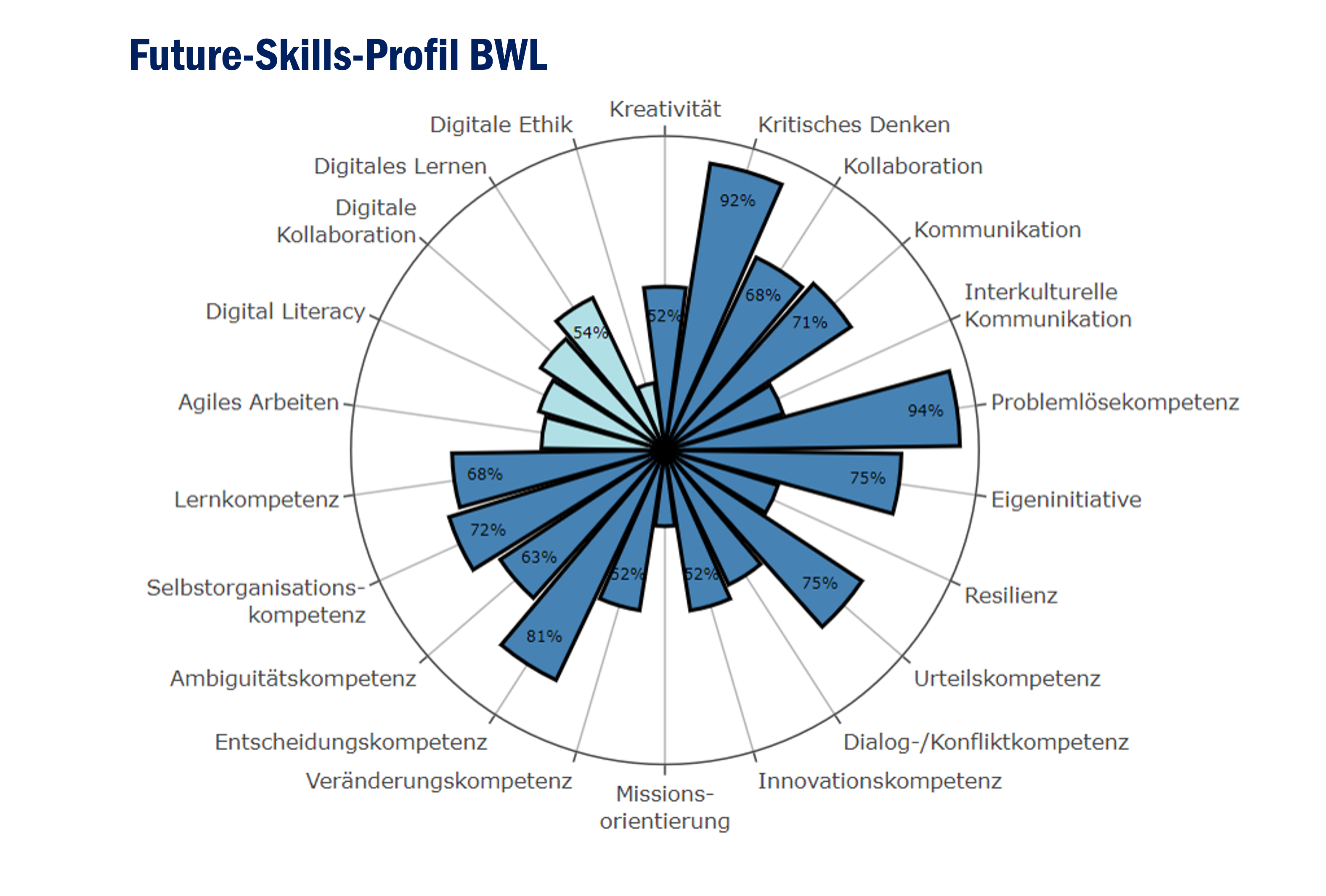
Students need a new set of skills for today’s and tomorrow’s world of work. An analysis by the CHE Centre for Higher Education of seven subjects in the fields of law and economics, as well as social work shows for the first time to what extent these “future skills” are already being promoted in teaching. While some future skills are already an established part of the curriculum, the promotion of digital future skills still plays a rather minor role.
Gone are the days when students were taught only specialist knowledge
Megatrends such as digitalisation and artificial intelligence, as well as global social challenges such as climate change, will have an enormous impact on the world of work in the future. In today’s fast-paced digital world, knowledge quickly becomes outdated. As a result, future graduates will need other skills besides specialist knowledge. In addition to digital skills, skills for lifelong learning and for solving problems that can no longer be tackled with existing knowledge alone are crucial.
“Expertise and future skills should not be pitted against each other. It is not an either/or choice. Instead, a new culture of learning should be established in HEIs, in which the acquisition of professional expertise and future skills go hand in hand,” remarked Nina Horstmann, Future Skills expert at CHE.
Strong promotion of some future skills
An evaluation by CHE now shows for the first time for eight subjects in Germany to what extent future skills are already being promoted in university teaching from the point of view of professors. Five of the 22 future skills surveyed are already particularly important in the subject areas of law and economics, as well as in social work. These are the results of a survey of around 3,500 professors at German HEIs conducted as part of the CHE University Ranking 2023. The professors surveyed were asked to assess the extent to which they already promote these future skills in their own courses for 22 future skills. From the point of view of the professors, future skills such as critical thinking, initiative, problem-solving, self-organisation and learning to learn are already “strongly” or “very strongly” promoted to an overwhelming extent.
For most future skills analysed, their promotion remains subject-dependent
However, there are clear differences between subjects in the importance attached to a range of future skills in teaching, as the analysis of the survey shows. For example, around three-quarters of business psychology professors said that they particularly encourage collaboration. However, only about a fifth of law professors said the same.
Around 80 per cent of the social work professors surveyed said that they pay particular attention to dialogue and conflict resolution skills in their courses. This was the case for just under a third of respondents in the field of economics. Such differences between the subjects under investigation can also be seen in the areas of creativity, decision-making and judgement, communication and intercultural communication, change and ambiguity skills, and innovation skills. Among the latter, the subjects of business informatics and industrial engineering stand out.
“The overall view of the subject-specific consideration of 22 future skills also provides, for the first time, the opportunity to map future skills profiles for individual subjects,” explained Nina Horstmann, who led the study. “In business administration, for example, it is clear that in many areas, university teaching is already very well placed, in the view of professors, to promote the non-digital future skills.”
Digital skills still play a subordinate role
Mission focus and resilience are among the future skills that have not yet received much attention. From the point of view of professors, digital skills are also promoted much less frequently than many non-digital future skills, although here too there are differences depending on the subject. For example, around 50 per cent of business informatics professors said that they particularly promote digital literacy. This was the case for only about 20 per cent of the law professors surveyed. Skills such as digital learning, digital collaboration, digital ethics and agile working are also comparatively poorly embedded in the subjects analysed.
According to Nina Horstmann, leader of the study, the results show that the teaching of future skills has been embraced to some extent in HEIs. However, the implementation of these future skills is still at an experimental stage.
In order to further promote future skills in higher education, CHE recommends, among other things, establishing the topic as a cross-cutting issue in all curricula and using new teaching/learning or examination formats for the acquisition of skills.
About the study:
The results were collected as part of the CHE University Ranking 2023. The results of an online survey of around 3,500 professors of law and economics subjects, and social work at German universities, universities of applied sciences and cooperative state universities were analysed. The survey asked about the promotion of a total of 22 different future skills in eight different subjects. The survey period was between December 2022 and January 2023. Further analysis for other subjects is in the pipeline for the next two years. The publication “Bildung für die Zukunft? Förderung von Future Skills in der Hochschullehre” (Education for the future? Promotion of future skills in university teaching) was written by Nina Horstmann. The analysis was published in October 2023 as Number 13 of the “CHE Impulse” series.
